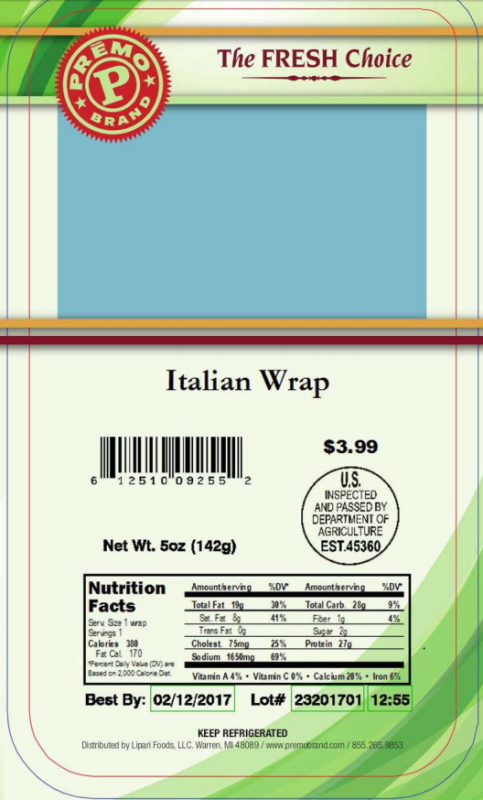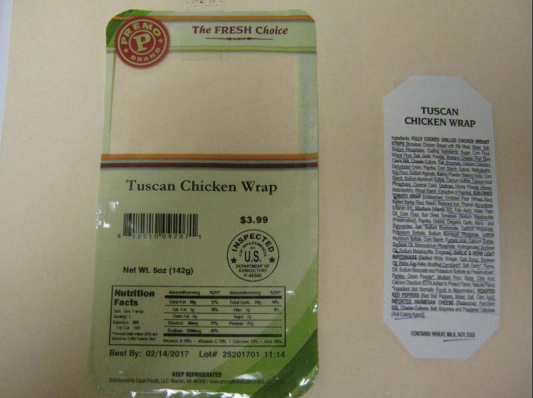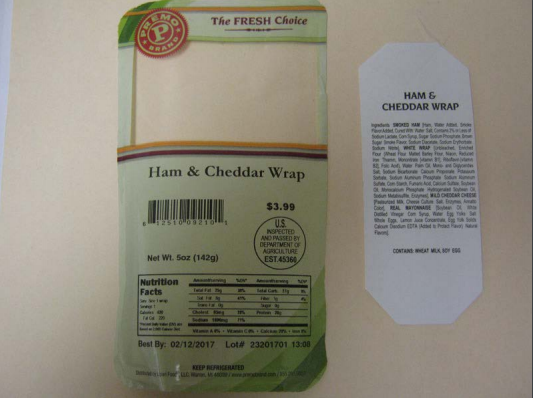WASHINGTON, Feb. 24, 2017 – The U.S. Department of Agriculture’s Food Safety and Inspection Service (FSIS) is issuing a public health alert due to concerns that meat and poultry wraps produced by JLM Manufacturing, a Shelby Township, Mich. establishment, may be contaminated with Listeria monocytogenes. A recall was not requested because it is believed that all products have been consumed and are past their “Best by” dates.
The PREMO Brand wraps were produced on Jan. 23, 2017 and Jan. 25, 2017 and have “Best by” dates of Feb. 12, 2017 and Feb. 14, 2017. The following products subject to the public health alert are:
- 5-oz plastic packages containing one “Ham & Cheddar Wrap.”
- 5-oz plastic packages containing one “Italian Wrap.”
- 5-oz plastic packages containing one “Tuscan Chicken Wrap.”
The products bear establishment number “EST. 45360” or “P-45360” inside the USDA mark of inspection. These items were shipped to retail locations in Illinois, Indiana, Kentucky, Maryland, Michigan, Ohio, Pennsylvania, Tennessee, Wisconsin and West Virginia.
The problem was discovered when the firm received notification from the cheese supplier that the cheese ingredient utilized in the meat and poultry wraps was included in an expanded cheese recall due to potential contamination with L. monocytogenes. There have been no confirmed reports of adverse reactions due to consumption of these products.
Consumption of food contaminated with L. monocytogenes can cause listeriosis, a serious infection that primarily affects older adults, persons with weakened immune systems, and pregnant women and their newborns. Less commonly, persons outside these risk groups are affected.
Listeriosis can cause fever, muscle aches, headache, stiff neck, confusion, loss of balance and convulsions sometimes preceded by diarrhea or other gastrointestinal symptoms. An invasive infection spreads beyond the gastrointestinal tract. In pregnant women, the infection can cause miscarriages, stillbirths, premature delivery or life-threatening infection of the newborn. In addition, serious and sometimes fatal infections can occur in older adults and persons with weakened immune systems. Listeriosis is treated with antibiotics. Persons in the higher-risk categories who experience flu-like symptoms within two months after eating contaminated food should seek medical care and tell the health care provider about eating the contaminated food.
Consumers who have purchased these products are urged not to consume them. These products should be thrown away or returned to the place of purchase.
Consumers with food safety questions can "Ask Karen," the FSIS virtual representative available 24 hours a day at AskKaren.gov or via smartphone at m.askkaren.gov. The toll-free USDA Meat and Poultry Hotline 1-888-MPHotline (1-888-674-6854) is available in English and Spanish and can be reached from 10 a.m. to 4 p.m. (Eastern Time) Monday through Friday. Recorded food safety messages are available 24 hours a day. The online Electronic Consumer Complaint Monitoring System can be accessed 24 hours a day at: https://www.fsis.usda.gov/reportproblem.


